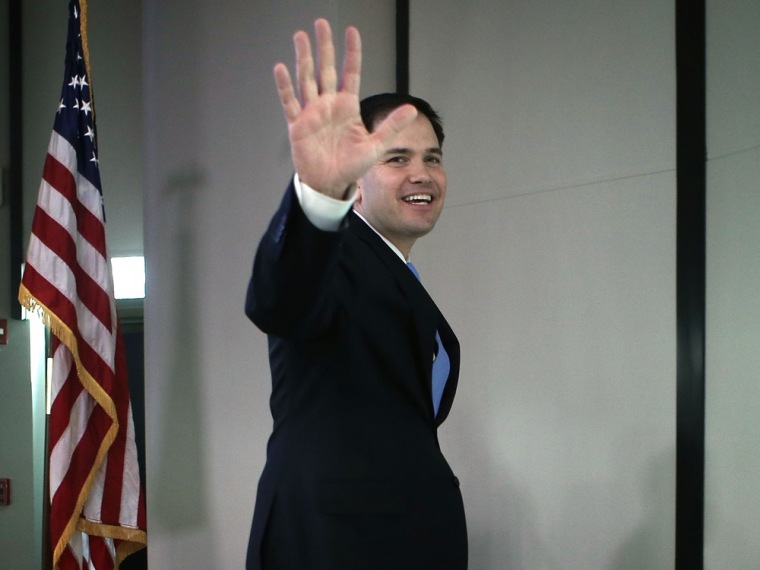Republican presidential hopefuls in 2016 shouldn’t fear that supporting immigration reform will threaten their chances of winning the GOP nomination, at least according to results from new focus groups released Thursday.
As the Republican Party wrestles with how – and whether – to advance comprehensive immigration reform that allows for a pathway to citizenship, new results from the conservative research group Resurgent Republic argues that presidential candidates shouldn’t worry about significant blowback in the 2016 primaries.
Resurgent Republic commissioned focus groups, conducted by Republican pollster John McLaughlin, of Republican primary voters in Iowa and South Carolina – the two more conservative states of the three-state gauntlet (sandwiching New Hampshire) that traditionally open the presidential nominating process. The research sought to take primary voters’ temperature toward immigration reform, and understand the circumstances under which they could support reform.
The report found that primary voters in Iowa and South Carolina realize that deporting the 12 million or so undocumented immigrants estimated to currently reside in the United States is impracticable. And while those voters strongly support legal immigration, they are receptive to arguments about immigration reform.
The focus groups found that border security is “foundational” for Republican primary voters, and that any pathway to citizenship must be linked to rigid requirements – including fines and back taxes, learning the English language and passing a criminal background check (among other details).
The findings are backed up by additional data. A Pew Research Center poll released this week found that 64 percent of Republicans believe undocumented immigrants should be allowed to stay in the United States legally; 34 percent of Republicans are opposed to such a proposition.
The results could be significant – not just for the ongoing debate over immigration reform in Congress, but for the GOP’s overall effort to reinvent itself and broaden its appeal, namely to Latino voters.
As recently as this past presidential election, Republican candidates used immigration as a wedge issue to distinguish themselves from other candidates – and primary voters played along.
Immigration, for instance, was one of the few issues on which Mitt Romney could run to the right of his primary opponents, and appeal to conservatives. When Texas Gov. Rick Perry said his fellow Republicans “don’t have a heart” for opposing in-state college tuition for children who were brought to the U.S. illegally, his primary opponents, including Romney, piled on. (Perry subsequently called his remark “inappropriate.”)
The new research released Thursday argues, essentially, that such an exchange – which hurt Romney with increasingly influential Latino voters in the general election – need not happen again in 2016.
That’s an especially important point considering how some of the prime contenders for the 2016 GOP nomination have gone to bat for immigration reform, and a pathway to citizenship.

Cuban-American Sen. Marco Rubio, R-Fla., for instance, has taken the lead in selling the Senate’s bipartisan immigration framework to skeptical conservatives. And Sen. Rand Paul, R-Ky., another potential contender for the nomination, added his voice earlier this month to the chorus of Republicans who broadly back a pathway to citizenship.
Other Republicans with potential presidential aspirations have been complimentary of those efforts. Wisconsin Rep. Paul Ryan, the GOP’s 2012 vice presidential nominee, has joined in the effort to help sell the Senate immigration proposal to more skeptical House Republicans. Ryan’s Badger State brethren, Gov. Scott Walker, told Politico in February that Republicans should embrace some process that gives undocumented immigrants a pathway to legalization.
It’s just as easy, though, to conceive of a candidate for the GOP nod in 2016 who disregards much of the advice in the Resurgent Republic report, and seeks to ingratiate him or herself with conservatives on the issue of immigration.
Already, Texas Sen. Ted Cruz, a Cuban-American conservative who’s won plaudits in conservative circles for his hard-charging first few months in Congress, has expressed vocal skepticism of immigration reform.
"I have deep, deep concerns about a path to citizenship for those who are here illegally," Cruz told the Dallas Morning News in a Q&A posted earlier this week. "And as a practical matter, if you want to see common sense immigration reform pass, insisting on a path to citizenship is the surest way to kill the bill."
The implications of the new research could face their first test far earlier than 2016, though.
Iowa and South Carolina, coincidentally, could both play host to competitive Republican primaries that test the issue of immigration reform.
In South Carolina, incumbent GOP Sen. Lindsey Graham has worked assiduously in recent years to ward off a conservative primary challenge. But his involvement in the same bipartisan Group of Eight as Rubio could earn him the enmity of conservatives in his state who oppose immigration reform.
And in Iowa, immigration hardliner Steve King, a longtime congressman in the state, could seek the state’s open Senate seat in 2014.